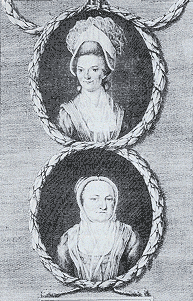Betje Wolff

Elizabeth ("Betje") Wolff-Bekker (24 July 1738 - 5 November 1804) was a Dutch writer.
Biography
Betje Bekker was born into a wealthy Calvinist family at Vlissingen. On 18 November 1759, at the age of 21, she married the 52-year-old clergyman Adriaan Wolff. In 1763 she published her first collection Bespiegelingen over het genoegen ('Reflections on Pleasure'). In 1777, after her husband's death, she lived together with Aagje Deken and from then on they published their work together. Among their greatest successes were the epistolary novels Historie van mejuffrouw Sara Burgerhart (1782) and Historie van den heer Willem Leevend (1784-1785). [1]
Because of their patriotic sympathies they moved to Trévoux in Burgundy in 1788. In 1789 they published Wandelingen door Bourgogne. She was exposed to some of the dangers of the French Revolution, and, it is said, escaped the guillotine only by her great presence of mind. In 1795 she returned to the Netherlands, and resided at the Hague till her death there at the age of 66.[1]
Other popular books by Betje Wolff and Aagje Deken were Abraham Blankaart (1787) and Cornelie Wildschut (1793-1796).
See also
Notes
- 1 2 Chisholm 1911, p. 661.
References
 This article incorporates text from a publication now in the public domain: Chisholm, Hugh, ed. (1911). "Bekker, Elizabeth". Encyclopædia Britannica 3 (11th ed.). Cambridge University Press. p. 661.
This article incorporates text from a publication now in the public domain: Chisholm, Hugh, ed. (1911). "Bekker, Elizabeth". Encyclopædia Britannica 3 (11th ed.). Cambridge University Press. p. 661.
External links
| Wikimedia Commons has media related to Betje Wolff. |
- Works by Elizabeth Bekker Wolff at Project Gutenberg
- Works by or about Betje Wolff at Internet Archive
- Works by Betje Wolff at LibriVox (public domain audiobooks)

|